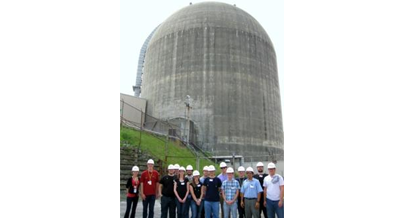Link to original press release: Click Here
Through Grant, Consortium of Eight Universities to Continue Work with Nuclear Labs on Research & Development
WASHINGTON – The Department of Energy’s National Nuclear Security Administration (NNSA) announced a grant award of $25 million to a University of California, Berkeley-led consortium of eight universities for research and development (R&D) in nuclear science and security. This long-term investment will support the consortium at $5 million per year for five years. The grant, awarded for the second time to the Berkeley-led consortium, followed announcement of a funding opportunity issued in May 2015.
The other consortium members include Michigan State University; the University of California, Davis; the University of California, Irvine; the University of Nevada, Las Vegas; George Washington University; Texas A&M University; and the University of Tennessee, Knoxville. These eight universities partner with five national laboratories: Los Alamos National Laboratory, Lawrence Berkeley National Laboratory, Lawrence Livermore National Laboratory, Oak Ridge National Laboratory, and Sandia National Laboratories.
“NNSA pursues its mission in nuclear security through the application of world-class capabilities, and meets the evolving challenges of tomorrow through our commitment to innovation and research in the fundamental sciences needed to adapt to this dynamic yet enduring nonproliferation and nuclear security mission,” said Anne Harrington, NNSA Deputy Administrator for Defense Nuclear Nonproliferation. “I am confident that more basic research efforts in academia will complement the applied efforts of the national laboratories and industry in supporting the critically important national security goals of our country.”
One of the missions of the NNSA is to lead investment in the R&D of new technologies in support of the Nation’s nuclear security and nonproliferation goals. To meet this mission, DOE/NNSA sponsors R&D across all disciplines of nuclear science and security. The consortium’s three primary objectives supporting this mission are:
- Provide an effective conduit for integration of basic academic and applied national laboratory research.
- Provide basic research in concepts, technologies, and paradigms that is complementary to lab research and required for meeting the nonproliferation mission.
- Prepare new nonproliferation experts for careers in the DOE laboratories and related federal service.
The new consortium will carry out R&D in four technical areas: nuclear and particle physics; radiochemistry and forensics; nuclear engineering; and nuclear instrumentation and radiation detection. Linking these R&D areas are four crosscutting disciplines: nuclear data; modeling and simulation; nuclear security policy; and education and training. Together they provide a framework that yields new ideas, relevant technology developments, and equips personnel with the integrated capabilities required for the nuclear security mission. Other non-DOE organizations that will benefit from the consortium include the Departments of State, Defense, Homeland Security, Justice, and the Intelligence Community.
JAN



